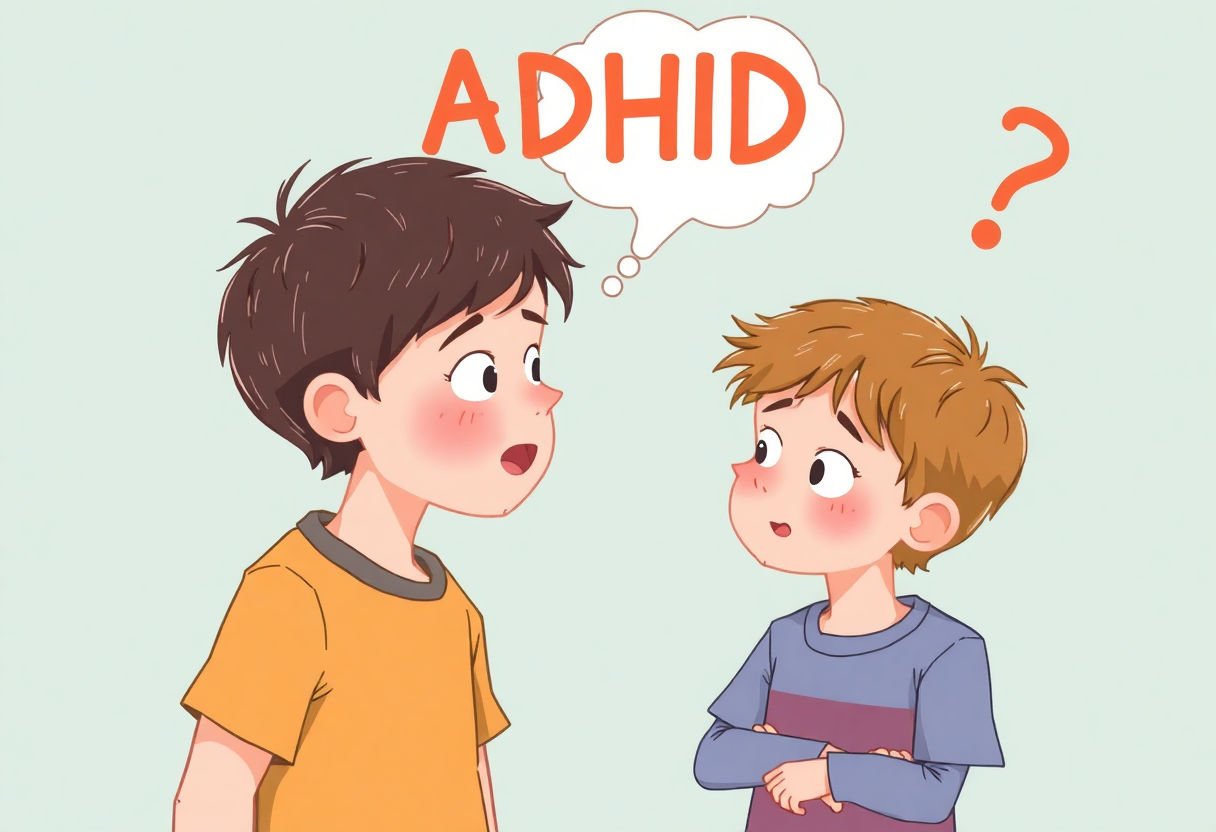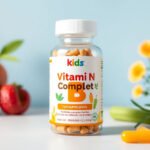Understanding the complex role that vitamins play in managing ADHD symptoms in children is crucial for developing an effective treatment strategy. This article explores the potential benefits of specific vitamins such as Vitamin B6 and Vitamin D, alongside the holistic impact of omega-3 fatty acids. Through a comprehensive examination of these nutrients, we aim to uncover how they contribute to symptom reduction and support brain health. By emphasizing balanced nutrition as part of a broader treatment plan, we offer insights into integrating these dietary supplements with traditional approaches, ensuring a robust management framework for children with ADHD.
Key Takeaways
- Understanding the role of vitamins is crucial in managing ADHD symptoms, offering a complementary approach to traditional therapies.
- Specific vitamins, particularly B6 and D, may play a significant role in improving brain health and alleviating symptoms in children with ADHD.
- Omega-3 fatty acids have been linked to symptom reduction, showcasing the importance of nutritional supplementation in ADHD management.
- Combining vitamin supplements with conventional treatments can lead to a more comprehensive and effective management strategy.
- Parents should be aware of potential risks and considerations when integrating vitamin supplementation into their child’s ADHD treatment plan.
Defining ADHD and Its Symptoms

Attention Deficit Hyperactivity Disorder, commonly referred to as ADHD, is a complex neurological disorder that typically manifests in childhood. It is characterized by a persistent pattern of inattention, hyperactivity, and impulsivity, which can significantly interfere with a child’s development, social skills, and educational performance.
Inattention is often identified as a major symptom and includes behaviors such as making careless mistakes, difficulty maintaining focus, and often losing things necessary for tasks and activities. Children with ADHD may also appear to be constantly daydreaming and may not seem to listen when spoken to directly.
Hyperactivity presents itself through excessive fidgeting or an inability to remain seated in appropriate situations. Children may run or climb in situations where it is not suitable or exhibit an inability to play quietly.
In terms of impulsivity, this symptom is seen as the child having trouble waiting for their turn or frequently interrupting others. Impulsive behaviors might result in hasty actions often occurring in the moment without forethought, which can lead to various social and personal challenges.
Understanding the nuances of ADHD symptoms is crucial for identifying the disorder early and accurately. This understanding forms the foundation for evaluating treatment options, including the role that nutrition and specific vitamins can play. By recognizing ADHD’s core symptoms in children, caregivers and healthcare providers can create more effective and personalized management strategies that address the unique needs of each child.
The Importance of Nutrition in Managing ADHD
In managing ADHD, nutrition plays a pivotal role. A well-rounded diet, rich in essential nutrients, can significantly influence behavioral and cognitive outcomes in children with ADHD. Several studies suggest that nutritional deficiencies may exacerbate ADHD symptoms, making dietary considerations crucial for effective management.
Balanced Diet Impact
A diet that includes a proper balance of proteins, carbohydrates, and healthy fats supports overall brain function. Proteins are essential for neurotransmitter production, directly affecting mood and concentration, while healthy fats, such as those from fish or nuts, contribute to brain health.
Importance of Specific Vitamins
Certain vitamins have shown particular promise in alleviating ADHD symptoms:
- Vitamin B6: Crucial for neurotransmitter synthesis, it aids in converting amino acids into serotonin, dopamine, and norepinephrine — neurotransmitters that regulate mood and attention.
- Vitamin D: Besides its well-known role in bone health, vitamin D is critical for brain development and function. A deficiency has been linked to worsened symptoms of ADHD.
Dietary Considerations
Incorporating fruits, vegetables, lean proteins, and whole grains can ensure that children receive the nutrients necessary for managing ADHD. Moreover, reducing sugar and processed food intake can help stabilize energy levels and improve focus. Parents may consider consulting with a nutritionist to create a diet plan tailored to their child’s needs.
The approach to managing ADHD symptoms through nutrition emphasizes not only alleviating symptoms but also supporting overall health and well-being, making it an integral component of comprehensive ADHD management strategies.
Vitamin B6 and Its Effects on ADHD
Vitamin B6, also known as pyridoxine, plays a crucial role in the synthesis of neurotransmitters that regulate mood and behavior, such as serotonin, dopamine, and norepinephrine. This makes it a significant focus in the management of Attention Deficit Hyperactivity Disorder (ADHD) in children. ADHD is often associated with an imbalance in these neurotransmitters, and adequate levels of vitamin B6 may contribute to restoring balance, thereby potentially reducing symptoms.
Research indicates that vitamin B6 may enhance cognitive function and improve attention span, which are often compromised in children with ADHD. Some studies suggest that supplementation with vitamin B6 can lead to noticeable improvements in behavior. For instance, it has been observed that children receiving vitamin B6 supplementation may exhibit greater attention and fewer hyperactive behaviors.
The effectiveness of vitamin B6 in managing ADHD symptoms is frequently compared to traditional medications. While medications act swiftly, vitamin B6 offers a more natural approach with minimal side effects. However, it is essential for parents and healthcare providers to monitor dosages accurately, as excessive intake of vitamin B6 can lead to nerve damage over time.
Key benefits of vitamin B6 supplementation for ADHD include:
- Improved neurotransmitter synthesis: Assists in the production of serotonin and dopamine.
- Enhanced mood regulation: Supports emotional stability and reduces irritability.
- Improved focus and behavior: Contributes to better attention spans and reduced hyperactivity.
While vitamin B6 alone may not be a complete treatment for ADHD, integrating it within a comprehensive treatment plan, including behavioral therapies and dietary management, can offer valuable support in alleviating symptoms.
The Role of Vitamin D in ADHD Management

Vitamin D, often referred to as the “sunshine vitamin,” plays a crucial role in maintaining brain health, which is particularly significant in managing Attention Deficit Hyperactivity Disorder (ADHD) symptoms in children. Primarily produced in the skin upon exposure to sunlight, vitamin D is also obtainable through certain foods and supplements.
Research suggests that vitamin D supports the brain’s functioning by contributing to the regulation of neurotransmitters, such as dopamine, which are often imbalanced in individuals with ADHD. Furthermore, it is involved in neuroplasticity—the brain’s ability to adapt and reorganize itself—which is essential for cognitive processes including attention and memory.
Key functions of vitamin D in ADHD management include:
- Cognitive Enhancement: Adequate levels of vitamin D have been linked to improved cognitive performance in children, potentially alleviating some ADHD symptoms.
- Behavioral Regulation: Evidence indicates that vitamin D supplementation can lead to improvements in behavior, reducing hyperactivity and impulsivity in young individuals with ADHD.
- Mood Stabilization: Vitamin D is also associated with mood regulation, which is beneficial given the emotional challenges often encountered by children with ADHD.
While vitamin D may not be a standalone treatment, its potential to work synergistically with other interventions makes it a valuable component of a comprehensive treatment strategy. Ensuring optimal vitamin D levels through safe sun exposure, diet, and supplements, as needed, can support overall mental health and may contribute positively to managing the symptoms of ADHD in children.
Exploring the Benefits of Omega-3 Fatty Acids

Omega-3 fatty acids, primarily found in fish oil, have become increasingly recognized for their potential benefits in managing ADHD symptoms in children. These essential fats are crucial for brain health, influencing functions such as attention and behavior. In recent studies, omega-3 supplementation has shown promise in reducing the severity of these symptoms, offering a natural adjunct to traditional ADHD treatments.
Benefits of Omega-3 Fatty Acids:
- Enhanced Cognitive Function: Omega-3 fatty acids are vital for maintaining brain structure and promoting neural communication. This can lead to improved focus and concentration, which are often challenging for children with ADHD.
- Mood Stabilization: By regulating neurotransmitter pathways, omega-3s can help manage mood swings and emotional regulation, contributing to decreased impulsivity and better social interactions.
- Reduced Hyperactivity: Some research indicates that omega-3 supplementation can lessen hyperactive behaviors, aiding in the overall calmness of affected children.
Clinical trials have indicated that children with ADHD often have lower levels of specific omega-3 fatty acids. Supplementation not only restores balance but may also improve synaptic transmission, which is crucial for learning and memory. Dr. Alex Richardson, a noted researcher in the field, emphasizes, “Omega-3 plays a pivotal role in brain development and function, making it an important dietary component for managing ADHD.”
For parents considering omega-3 supplements for their child, choosing high-quality, purified fish oil is essential to ensure safety and efficacy. Incorporating these fatty acids into the diet can serve as a powerful tool in the holistic management of ADHD, supporting both pharmaceutical and behavioral interventions.
Integrating Vitamins with Other Treatment Options
Integrating vitamins with other treatment options for ADHD can provide a comprehensive approach to managing symptoms in children. While vitamins such as B6 and D have shown potential in supporting neurotransmitter function and enhancing brain health, these should not be viewed as standalone remedies. Instead, they complement other established treatments to form a holistic strategy.
The inclusion of vitamin supplements in a child’s ADHD management plan should be done cautiously and in consultation with healthcare providers. This ensures that vitamins enhance, rather than hinder, existing treatments. For children already on medication like stimulants or non-stimulants prescribed for ADHD, vitamins can support overall well-being, possibly improving outcomes when integrated carefully.
Moreover, cognitive behavioral therapy (CBT) and other behavioral interventions can be synergistically combined with vitamin supplementation. Vitamins can enhance brain function, making children more receptive to behavioral modifications advocated by therapy. Similarly, regular physical activity, another crucial component of ADHD management, benefits greatly from proper nutrition, with vitamins ensuring that energy levels and cognitive function are maximized.
Multimodal treatment plans are often the most successful in managing ADHD symptoms effectively. This means that alongside medication, diet, rich in specific vitamins, therapy, and lifestyle changes such as exercise and adequate sleep, play integral roles. Regular monitoring and adjustments by healthcare providers are vital to tailor these interventions to the unique needs of each child, ensuring safety and efficacy.
In summary, while vitamins offer valuable benefits, their greatest potential lies in their integration with a broader treatment plan, aimed at empowering children with ADHD to thrive in their daily lives.
Risks and Considerations with Vitamin Supplementation

When contemplating vitamin supplementation for children with ADHD, it’s crucial to weigh the potential benefits against the possible risks and drawbacks. Though vitamins offer an approach to managing ADHD symptoms, several considerations must be addressed.
One primary concern is the risk of overdose. Excessive intake of certain vitamins, such as Vitamin A or D, can be toxic. It is essential to adhere to recommended dosages and consult a healthcare provider before starting any supplement regimen.
Nutrient interactions present another challenge. Supplements can interact with medications that a child may already be taking. For instance, Vitamin E might interfere with certain ADHD medications, potentially altering their effectiveness.
Additionally, quality and purity of supplements is a significant consideration. Not all supplements maintain the same standards, and some may contain additives or impurities that could be harmful. Selecting brands that conduct third-party testing can mitigate some of these concerns.
The individual variability in response to supplementation cannot be overstated. Not all children will experience the same benefits from vitamin supplements, and some may require adjustments in types or dosages to see any improvement in ADHD symptoms.
It’s also important to highlight that while vitamins can support ADHD treatment, they should not be seen as a replacement for traditional therapeutic approaches like behavior therapy or medication. Comprehensive care, integrating various modalities, remains crucial for managing ADHD effectively.
Overall, while vitamin supplementation shows potential, it must be approached with caution, emphasizing informed decisions and professional guidance to ensure a safe and beneficial experience for children with ADHD.
Parental Guidance and Support

Supporting a child with ADHD through nutritional means is a vital aspect of parental guidance. Parents play a crucial role in implementing dietary changes and ensuring their child receives the necessary vitamins to manage ADHD symptoms effectively. Creating a structured meal plan that includes foods rich in essential vitamins such as B6, D, and omega-3 fatty acids can make a significant difference in symptom management. Encourage the incorporation of foods like fish, eggs, and leafy greens to support brain health.
Establishing a consistent routine for vitamin supplementation is also important. Parents should consult with a healthcare professional to determine appropriate dosages and ensure the supplements are safe for their child. It’s essential to monitor the child’s response and adjust the plan as needed in collaboration with healthcare providers.
Moreover, educating the child about the benefits of a balanced diet can foster a positive attitude towards these changes. Empower them by involving them in grocery shopping, meal preparation, or even growing a small garden to cultivate an interest in healthy eating habits.
Engaging with support groups or communities of other parents facing similar challenges can provide emotional support and practical advice. Sharing experiences and tips can alleviate the sense of isolation and uncertainty that often comes with managing a child’s ADHD symptoms.
Parents serve as a pivotal link between dietary interventions and overall treatment plans, combining care, support, and valuable nutritional insights to help their child thrive.
Conclusion
In conclusion, adequate nutrition, particularly through vitamins, plays a significant role in managing ADHD symptoms in children. While Vitamin B6 and Vitamin D support neurotransmitter function and brain health, Omega-3 fatty acids offer additional benefits, enriching traditional treatment approaches. As we integrate these nutrients into broader ADHD management strategies, understanding their potential is crucial for future advancements. Parents are encouraged to consider these nutritional elements thoughtfully, alongside conventional therapies, to enhance their child’s well-being. This holistic approach not only addresses symptoms but also fosters a more supportive environment for children with ADHD.
Frequently Asked Questions
Can vitamins replace medication in the treatment of ADHD in children?
Vitamins should not be used as a replacement for medication in managing ADHD. However, they can complement traditional treatments and support overall health, potentially aiding in symptom reduction.
Which vitamins are most commonly associated with managing ADHD symptoms?
Vitamins B6, D, and omega-3 fatty acids are frequently noted for their roles in improving neurotransmitter function and supporting brain health, thus potentially alleviating symptoms of ADHD.
Is it safe to give children vitamin supplements for ADHD without medical advice?
It is crucial to consult a healthcare professional before starting any vitamin supplements for children. Over-supplementation can lead to adverse effects and must be tailored to individual needs.
How long does it take to see improvements in ADHD symptoms with vitamin supplementation?
The time frame for observing improvements can vary among children and depends on several factors, including diet, dosage, and adherence to supplement regimens. Consistent use over weeks to months may be necessary.
Are there any risks associated with vitamin supplementation for children with ADHD?
Yes, excessive intake of certain vitamins can lead to toxicity and other health issues. It is important to follow recommended dosages and obtain regular monitoring from healthcare providers.


